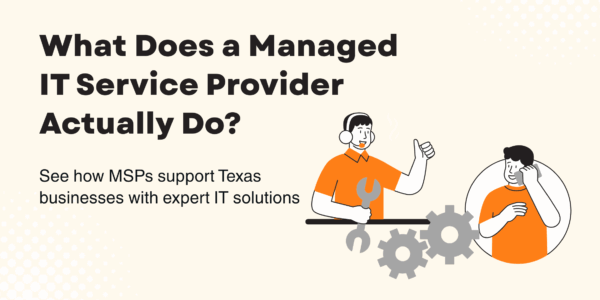If you’ve ever typed “What does a managed IT service provider do?” into a search…

9 Reasons to Invest in Co-Managed IT Services
IT’s importance has been growing rapidly over the last decades, and it’s one of the most important factors for corporate achievement in 2023. In fact, 71% of CFOs think that the success of their company depends on their ability to transform digitally.
Co-managed IT services are the ideal way to stay flexible and competitive in any industry. Read on to learn some benefits of these IT services and why you should take the leap.
1. Custom Integration Means Flexibility
Co-managed IT services mean that your business operates its IT infrastructure alongside a third-party provider. You retain control over some things while relinquishing other functions to the professional IT co-manager.
This partnership is extremely nuanced and coordinated because it’s not one-size-fits-all. Different businesses have wildly different needs, especially those in various industries.
Those in mid-market health care may need access to patient records on in-house servers for HIPAA compliance and security reasons. However, they may be able to store employee-related records and financial documents on a third-party server to save storage space and money.
Commercial construction firms, on the other hand, may be able to keep client records on an external server. Fleet management applications and software may be the internal storage part of their IT system.
Co-managed IT is great because the models let people pick and choose which resources and data they want to get external help with. You’ll also get to select which processes, workflows, and sensitive information should exclusively stay in-house. It’s flexible, so a co-managed model will bend to your specific needs.
2. Save Money on In-House Services
In-house IT has many disadvantages, but the main one is that it’s extremely costly. Hiring an IT management professional means paying for their full-time salary and benefits. It also means shelling out for training and onboarding costs and needing to find new IT help if they quit.
Co-managed IT solutions solve this problem. Even if you hire someone in-house, you won’t need to pay them a full-time salary because they’ll have fewer responsibilities. If they quit, you won’t be left in the dust until you find a new in-house expert.
You also won’t need to pay for internal servers that store data and launch applications that could be managed externally. This means paying for less hardware and freeing up server space for things that must be stored in-house.
You’ll also save space. When you store all of your information in your company facility, you’ll need to store the hardware on the premises.
This can make it hard to get around. It could also force you to pay for more storage space or even a larger office.
Co-managed IT gives you the freedom to pick and choose what you store in-house. It also means that you won’t need to hire unnecessary employees.
3. Retain Control Over Your Operations
Many people prefer managed IT because it’s less expensive than in-house management. It also saves space.
However, fully outsourcing your IT infrastructure means that you might feel powerless over your information. A third party stores it and manages it, and while no reputable company will abuse that power, it still bothers some people. The managed IT company also provides security features and updates, which makes many business leaders feel out of control.
Co-managed IT means reaping the benefits of managed IT services. However, it also means that you get to retain control over the information and applications that matter most.
Rather than being the end-all-be-all of your IT, co-managed operations serve as an escalation point for any in-house IT experts that you hold dear. Plus, since it’s easier for a third party to co-manage rather than fully manage an IT infrastructure, you save even more money.
4. Simple Budgeting for Business Technology
In addition to saving money, co-managed IT can make it easier for you to create a budget. You won’t need to set aside money to hire a completely new staff. You also won’t need to allocate funds to buy entirely new equipment, which means less time spent trying to get everything to fit into your already-limited budget.
It’s easier to budget for co-managed IT than doing everything in-house. You only need to pay a predetermined monthly fee for some resources rather than paying for applications that do each specific thing. A third party already has software for routine functions like system maintenance and ticketing, so you won’t need to budget for several different technologies to perform these menial but important tasks.
5. You’ll Boost Productivity
Co-managed IT solutions can greatly boost productivity in any workplace. These services tend to cover routine activities like maintenance and upgrades.
Constant software updates mean that it’s less likely for your pages to load slowly and lag on either the company or consumer end. They also make downtime less likely so that employees can be productive all day, every day.
You’ll also get constant network monitoring that notifies you or experts of blips or changes that might mean downtime. This lets you see any potential problems immediately and troubleshoot them before they cause major issues for your network operations.
Beyond that, you’ll have extra support from the co-managing experts during peak demand periods. When your products are selling quickly and your in-house IT team is adapting to new demand and customer needs, you won’t be forced to stop working when minor tech-related emergencies arise.
Finally, a lack of simple technology issues boosts employee morale. They’ll be more satisfied without the frustration of software and network issues, and happy employees are 31% more productive. They’re also likely to make 37% more sales, so you’ll get more money and make more customers happy.
6. It’s Easier to Expand
A co-managed IT model makes it easier for businesses in several industries to expand.
For example, consider a small pharma firm with 25 people. If this firm plans to grow to employ about 200 people, an in-house IT model means that they’ll constantly need to purchase new hard drives and upgrade applications. This is costly and challenging, and it requires a lot of individual budgeting and research.
The problem is even greater if the firm wants to expand to new service areas or offer new types of pharmaceuticals. These transitions require more data, legal documents, and records. Bigger network bandwidth and more storage space are necessary.
Renting or buying a new office or operational headquarters may also be an eventual necessity to hold all employees. This means taking a lot of hardware to a new place.
Co-managed IT lets you store everything on external servers while you make the move. You can grow without buying more hardware and keep data secure while migrating to new areas. Professionals will provide support for your growing IT needs during an otherwise chaotic transitional period.
7. Lower Risk of Breaches
IBM estimates that the average cost of a data breach is around $4.45 million. Since this is 15% higher than it was 3 years ago, top-notch cybersecurity is becoming increasingly important for businesses. This is especially true as the amount of digital data we store on business servers goes up as technology use increases.
Co-managed IT models can help keep you secure. You’ll gain access to top-of-the-line, expert-level security software with professional assistance. Experts know how to integrate them with your in-house infrastructure so that you don’t need to worry about a data breach.
For example, you’ll gain access to the most updated and high-grade firewalls and MFA features on the market. End-to-end encryption is also available. Plus, professional system monitoring can help alert you to potential threats so that you can proactively combat security risks.
8. Backup and Recovery
Since your information won’t just be stored on an internal server, you also will have an easier time recovering any lost data. In the unlikely event of a breach or severe system error, you’ll have a readily available backup at your professional co-manager’s facility.
Better yet, co-management models mean constant automated backups. You’ll retain and save all necessary information automatically. This means you don’t need to worry about manual backups.
9. Constant Support Reduces Problems
Working hand-in-hand with a co-management team means round-the-clock support. Your IT partners will add value to your business by constantly answering questions and immediately troubleshooting problems that you point out. This means better cybersecurity and immediate solutions for important support tickets.
You also can ask them any questions you have about your IT infrastructure. This will give you a greater understanding of your technology and let you make more effective business plans.
Invest in Co-Managed IT Services Today
Co-managed IT services combine the best of in-house IT operations with the benefits of third-party management. Now that you know the advantages of these business solutions, it’s time to become more productive and secure with top-notch co-management partners.
Terminal B’s team is committed to helping you create an IT management plan so that you can store and access all the information you need in both the short and long term. We’ll talk about building a custom plan that gives you all the support you need while still keeping you in control when it matters.
Get in touch with our Texas IT team to learn how we can bolster your small-to-medium business ASAP.


